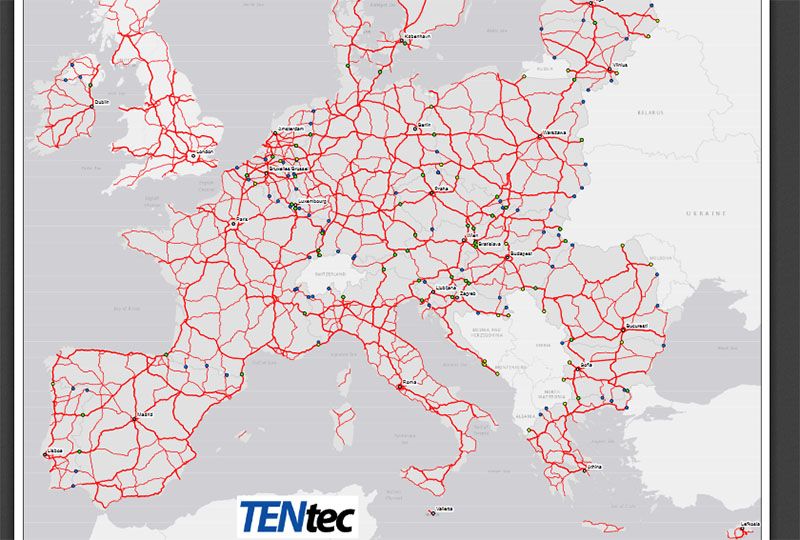
EUROPE – Earlier this week the European Commission (EC) issued new practical advice on how to implement its Guidelines for border management, the so called 'Green Lanes' policy, in order to keep the supply chain linked and freight moving across the EU during the current pandemic.
The change saw instructions issued to all member states to designate, without delay, all the relevant internal border-crossing points on the trans-European transport network (TEN-T) as green lane border crossings. This decrees that all freight vehicles, whatever goods they are carrying will pass freely through the open border crossing and any stoppages, including any checks and health screening, should not take more than 15 minutes.
Any such border checks must be minimised and streamlined to what is strictly necessary. Checks and screening should be carried out without drivers having to leave their vehicles, and drivers themselves should undergo only minimal checks. Drivers of freight vehicles should not be asked to produce any document other than their identification and driving licence, and if necessary, a letter from their employer. The electronic submission/display of documents should be accepted.
The EC is clearly conversant with some of the problems drivers frequently face when transiting certain countries, it went on to say that no freight vehicle or driver should face discrimination, irrespective of origin and destination, the driver's nationality or the vehicle's country of registration. In light of the current situation, Member States were also urged to temporarily suspend all road access restrictions currently in place in their territory, such as weekend, night and what it calls ‘sectoral bans’.
Member states were encouraged to set up safe passage transit corridors to allow private drivers and their passengers, such as health and transport workers, as well as EU citizens being repatriated, regardless of their nationality, to directly pass with priority through the country in each necessary direction along the TEN-T Network. This should be done while staying strictly on the designated route and to take the necessary minimum rest breaks. Member States should also ensure that they have at least one airport functional for repatriation and international relief flights.
Following a video-conference between EU Transport Ministers on 18 March, the Commission set up a network of national contact points and a platform to provide information on national transport measures taken by Member States in response to the coronavirus. The national contact pointsshould support the effective functioning of the green lane border crossing points. Neighbouring non-EU countries were invited to work closely with this network to ensure the flow of goods in all directions.
To keep transport moving, the Commission has recommended that Member States take action to ensure the free movement of all workers involved in international transport, whatever the transport mode. In particular, rules such as travel restrictions, and mandatory quarantine of transport workers not displaying symptoms, should be waived. For example, Member States should not require that transport workers carry a doctor's certificate to prove their good health.
To ensure the safety of transport workers, enhanced hygiene and operational measures are also needed in airports, ports, railway stations and other land transport hubs. A note from the Commission included a full list of recommendations to protect drivers from the coronavirus. Internationally recognised certificates of professional competence should be considered sufficient to prove that a worker is active in international transport. In the absence of such certificates (not all international drivers have one), a letter signed by the employer should be accepted.
The EC further decreed that all of these principles should also apply to third country nationals if they are essential to ensuring that cargo moves freely within and into the EU. A statement that could presumably have some meaning for the recently departed UK. Commissioner for Transport Adina V?lean explained the EC instructions, saying:
“The EU's transport network connects the whole of the EU. Our guidance document is intended to protect the EU's supply chains in these difficult circumstances, and to make sure both goods and transport workers are able to travel to wherever they are needed without delay. A collective and coordinated approach to cross-border transport is more important today than ever before. The green lanes are also specifically designed to protect transport workers at the frontline of this crisis. This set of recommendations will ease their already stressful mission and it will bring more safety and predictability to their work.”
The decree from the EC has been warmly welcomed by the logistics community, the European Rail Freight Association (ERFA), whose members called for this policy following the video conference last week were pleased to see its adoption but stressed the need for individual states to pick up the baton and ensure the measures out lined were acted upon immediately, a point made by Conor Feighan, ERFA Secretary General who said it needed ‘the spirit of the guidelines [to] be adopted by national authorities.’ He was supported by Dirk Stahl, ERFA President, saying:
“For rail freight to offer a solution to shippers and retailers moving freight internationally, we need predictable and coordinated capacity management. We strongly welcome the good work done by infrastructure managers to date to address these needs. We now need a strong commitment that green lanes will continue to operate around the clock and that any capacity reductions will be done in a coordinated manner and in consultation with rail freight undertakings.”
Source:handyshippingguide
The opinions expressed herein are the author's and not necessarily those of The OLO News.
Quality Companies